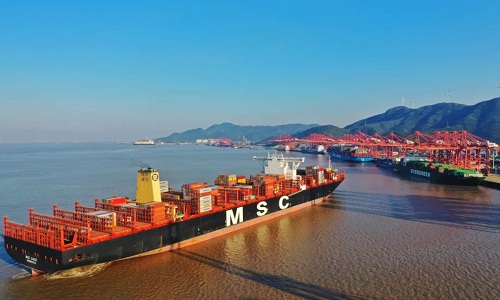Zhejiang FTZ's Ningbo innovation zone

The overall plan of the Ningbo innovation zone of the China (Zhejiang) Pilot Free Trade Zone is unveiled on March 6. [Photo/cnnb.com.cn]
The overall plan for the Ningbo innovation zone of the China (Zhejiang) Pilot Free Trade Zone was unveiled on March 6.
The plan, released by the Zhejiang Provincial Department of Commerce, specified the zone's scope and functions.
The move comes after the provincial government approved the establishment of six innovation zones in Hangzhou, Ningbo, Wenzhou, Jiaxing, Jinhua, and Taizhou to coordinate with the Zhejiang FTZ in Zhoushan in late 2019.
The coordinated innovation zones serve as an extension of the FTZ.
According to the plan, the Ningbo innovation zone occupies an area of 119.87 square kilometers and is divided into four areas: Lingang area (70.56 km²), Linkong area (8.71 km²), Yongjiang area (15 km²), and Qianwan area (25.6 km²).
The Lingang area comprises of the Daxie area, Meishan area, Ningbo bonded area, Beilun area, and Zhenhai area.
The Daxie area will focus on the construction of a LNG landing center and an international center for oil production, storage, transportation, and trade, while the Meishan area aims to become a supply chain innovation policy center with global influence.
The bonded area will focus on promoting digital trade, bulk commodity trade, bonded trade, and the innovative application of supply chains so as to build a new type of trade and supply chain service center.
The Beilun area will strive to become a hub for emerging industries with a focus on new chemical materials and integrated circuits, while the Zhenhai area will focus on the import and export of bulk commodities and the construction of a center for the storage, transportation, and trade of oil and chemical products.
Meanwhile, the Linkong area is set to focus on the development of aviation services, aviation logistics, cross-border trade, smart airport manufacturing, and more. It will strive to become a comprehensive regional transportation hub and an emerging airport industrial cluster.
The Yongjiang area will focus on the development of industries such as new materials, intelligent manufacturing, and digital economy, and work to strengthen R&D and software design with the ultimate goal of becoming a scientific and technological innovation hub in the Yangtze river delta and a global R&D center for intelligent manufacturing.
Meanwhile, Qianwan will strive to become an advanced manufacturing base and a high-quality foreign investment cluster by developing several high-tech industries, including automobile manufacturing, high-end equipment, living and health products, new materials, electronic information, and modern services.
Zhang Huaqiong, chief economist of the Ningbo municipal bureau of commerce, revealed that the Ningbo innovation area is poised to become a center for international oil and gas resource allocation, international trade, and new materials and intelligent manufacturing, as well as a national demonstration zone for high quality development in the manufacturing industry.

 Print
Print Mail
Mail
 20 Cultural Symbols
20 Cultural Symbols Why Zhejiang
Why Zhejiang Experiencing high-tech products at WIC
Experiencing high-tech products at WIC Zhejiang Release
Zhejiang Release Zhejiang News
Zhejiang News